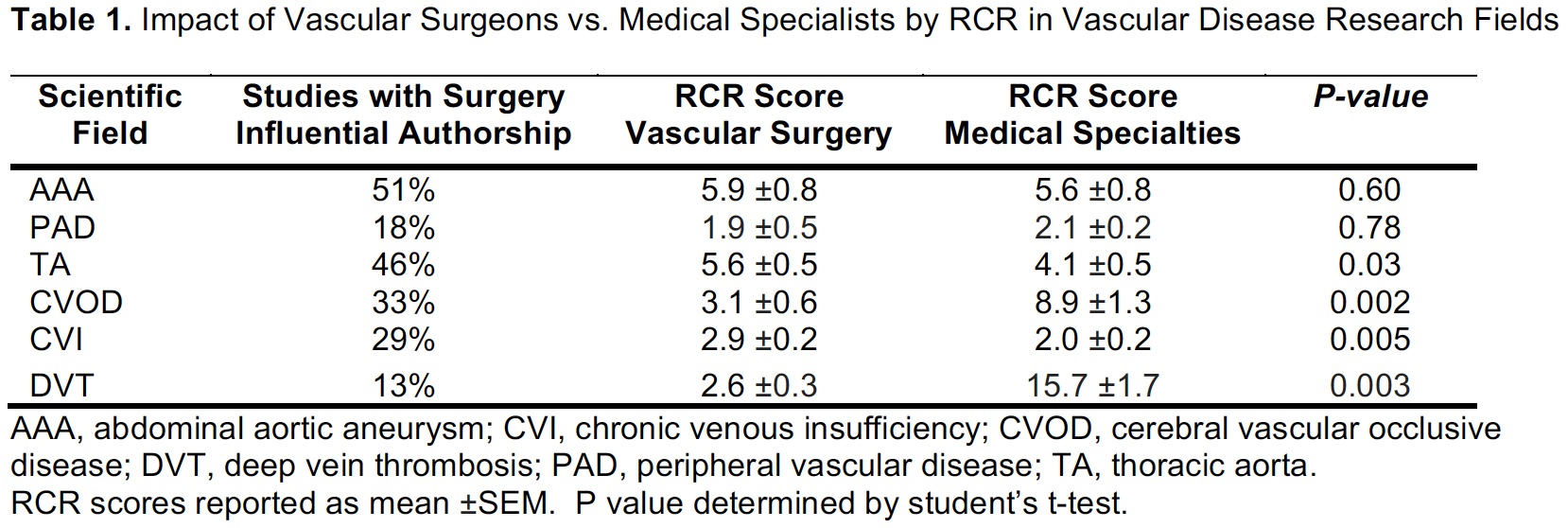Accessing Trends in Academic Impact of Vascular Surgeons Within the National Institutes of Health iCite Database
Frank M Davis, Andrea Obi, Katerine Gallagher, Peter K Henke
University of Michigan, Ann Arbor, MI
Background: A diverse array of measures are used to evaluate academic physicians. One critical factor is the scholarly impact an author has upon the research discourse within a field. Recently, the National Institutes of Health (NIH) developed the relative citation ratio (RCR) as a method to quantify the impact of published research. The aim of this study was to examine the academic impact of vascular surgeons using RCR within common vascular disease research fields.
Methods: Using the Pubmed and NIH iCite database, the scientific fields of abdominal aortic aneurysm (AAA), thoracic aneurysm, peripheral arterial disease (PAD), carotid disease, deep venous thrombosis (DVT), and venous insufficiency were queried for the twenty highest rated articles in each category (1997-2012). Article categories were divided into basic science, health services, and clinical research. To calculate the RCR, article citation rates are divided by an expected citation rate derived from performance of articles in the same field. The resulting RCR is article level and field independent and provides a validated and more accurate measure than journal impact factors. For articles, academic background of the first and last author (‘influential authors') were collected analyzing procedural specialty: surgery, medicine subspecialty (cardiology, neurology, nephrology), engineering/radiology, and other (anesthesia and pediatrics). Statistical significance between scientific fields and academic background were determined using Student t-tests or ANOVA followed by Newman-Keuls post hoc test.
Results: The academic impact of vascular surgeons varied substantially based on the scientific field (Table I). Vascular surgeons as compared with medical specialists were found to have the highest academic impact in the field of AAA research comprising 51% of the influential authors on the highest rated RCR studies (5.9 ±0.8 vs. 5.6 ±0.8, p = 0.6). In contrast, vascular surgeons only comprised 13% of influential authors as compared with medical specialists in DVT (RCR = 2.6 ±0.3 vs. 15.7 ±1.7; p <0.003) and 18% in PAD (RCR = 1.9 ±0.5 vs 2.1 ±0.2, p=0.78). Grouping all vascular fields of study together, no difference in RCR was found between vascular surgery and radiology/engineering. However, the mean RCR was significantly lower for vascular surgeons compared to medical subspecialties (4.5 ±0.4 vs. 6.8 ±0.5, p<0.05).
Conclusions: Vascular surgeons exhibit a moderate academic impact in the field of aneurysmal disease but lag behind medical subspecialists in quantity of highest impact scientific contributions to the fields of PAD and DVT.

Back to 2019 Posters
